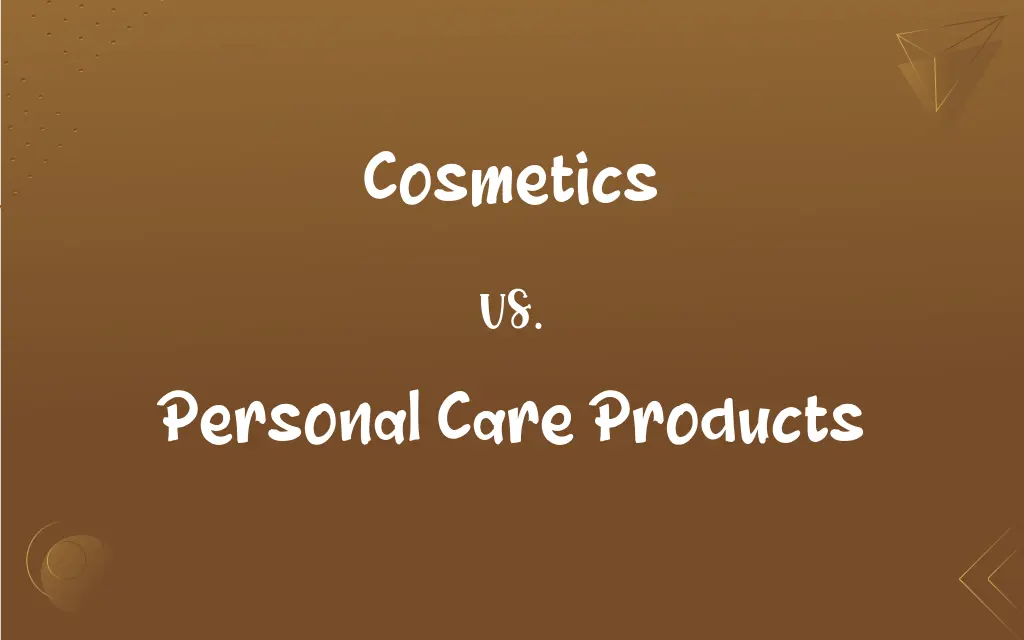Cosmetics vs. Personal Care Products: What's the Difference?
Edited by Aimie Carlson || By Janet White || Published on March 2, 2024
Cosmetics are substances for enhancing appearance, while personal care products are for hygiene and personal grooming.

Key Differences
Cosmetics primarily focus on enhancing or altering appearance, such as makeup or fragrance, used to improve facial features or body scent. Personal care products, on the other hand, emphasize hygiene and health, including items like shampoo, toothpaste, and deodorants, aimed at maintaining cleanliness and grooming.
In the realm of ingredients, cosmetics often contain colorants, fragrances, and other aesthetic enhancers, while personal care products include functional ingredients like cleaning agents, moisturizers, and antiperspirants to support hygiene and health.
Regulatory oversight for cosmetics and personal care products can differ significantly, with cosmetics typically subject to less stringent regulations focused on safety and labeling, whereas personal care products, especially those with therapeutic claims, may face stricter scrutiny to ensure efficacy and safety.
Consumer perception also diverges; cosmetics are often seen as luxury or discretionary items used for beautification, whereas personal care products are considered essential for daily hygiene and health maintenance.
Comparison Chart
Purpose
Enhance or change appearance
Maintain hygiene and health
ADVERTISEMENT
Examples
Lipstick, foundation, mascara
Soap, shampoo, toothpaste
Focus
Aesthetic appeal, beauty
Cleanliness, health maintenance
Regulation
Safety regarding skin reactions
Often stricter, can include therapeutic claims
Marketing
Beauty trends, self-expression
Health, hygiene, essential daily use
Cosmetics and Personal Care Products Definitions
Cosmetics
Cosmetics are used to enhance or alter one's appearance.
She applied mascara to highlight her eyes.
ADVERTISEMENT
Personal Care Products
Personal care products are essential for daily hygiene routines.
He used antibacterial soap to ensure thorough handwashing.
Cosmetics
They come in various forms, including powders, liquids, and creams.
For her evening look, she chose a cream-based eyeshadow.
Personal Care Products
Sustainability and natural ingredients are becoming more prominent in personal care products.
The new line of personal care products boasted all-natural ingredients and biodegradable packaging.
Cosmetics
The cosmetic industry is driven by trends and innovation.
The latest cosmetic line featured environmentally friendly packaging.
Personal Care Products
Many personal care products contain active ingredients for health benefits.
Her toothpaste contained fluoride to prevent cavities.
Cosmetics
Cosmetics can be temporary and are often removed daily.
She removed her makeup every night before bed.
Personal Care Products
These products are often formulated for specific health needs.
The dermatologist recommended a hypoallergenic body wash for her sensitive skin.
Cosmetics
They play a significant role in fashion and self-expression.
He used bold lipstick colors as a form of self-expression.
Personal Care Products
They include products for hair care, oral care, and skin care.
Her personal care routine included organic shampoo and conditioner.
Cosmetics
A preparation, such as powder or a skin cream, designed to beautify the body by direct application.
FAQs
How are cosmetics regulated differently from personal care products?
Cosmetics are regulated mainly for safety in terms of skin irritation and allergies, while personal care products may have stricter regulations, especially if they make therapeutic claims.
Is the use of natural ingredients more common in cosmetics or personal care products?
Natural ingredients are increasingly common in both categories, but they are particularly emphasized in personal care products for their perceived health benefits.
Why are personal care products essential?
Personal care products are essential for maintaining hygiene, health, and well-being, addressing needs like cleaning, moisturizing, and protection.
What role do personal care products play in public health?
Personal care products, like hand sanitizers and antibacterial soaps, play a crucial role in public health by promoting hygiene practices that prevent illness.
Can a product be both a cosmetic and a personal care product?
Yes, some products like moisturizing sunscreens or tinted lip balms may blur the lines between cosmetics and personal care.
Can personal care products be used for aesthetic purposes?
While primarily for health and hygiene, some personal care products, like moisturizers and hair conditioners, can enhance appearance by improving skin texture and hair health.
How has consumer demand influenced the development of personal care products?
Consumer demand for natural, sustainable, and health-conscious products has led to significant innovation and diversification in the personal care product industry.
Are makeup products considered personal care products?
Makeup products are typically categorized as cosmetics, not personal care products, due to their primary purpose of enhancing appearance.
How do trends affect the cosmetics industry?
Trends greatly influence the cosmetics industry, driving innovation, product development, and marketing strategies.
Are deodorants considered cosmetics or personal care products?
Deodorants are typically classified as personal care products because they are used for hygiene purposes to control body odor.
How do cultural perceptions impact the use of cosmetics and personal care products?
Cultural perceptions greatly impact the use and acceptance of cosmetics and personal care products, influencing beauty standards, hygiene practices, and product preferences.
What distinguishes a cosmetic from a medical product?
Cosmetics are for aesthetic purposes without altering the body's structure or functions, while medical products are intended to diagnose, treat, cure, or prevent diseases.
Are organic ingredients in personal care products safer or more effective?
Organic ingredients in personal care products are perceived as safer by some consumers due to fewer chemicals, but effectiveness can vary and is not guaranteed by organic status alone.
Can cosmetics have any health benefits?
While cosmetics are primarily for aesthetic purposes, some may contain ingredients with added health benefits, such as moisturizers with SPF.
How important is packaging in the cosmetics industry?
Packaging is crucial in the cosmetics industry for branding, user experience, and protecting the product, often influencing consumer choice.
How has the digital age affected the cosmetics industry?
The digital age has transformed the cosmetics industry by enabling online sales, digital marketing, and influencer partnerships, expanding reach and consumer engagement.
How do regulations differ internationally for cosmetics and personal care products?
Regulations for cosmetics and personal care products vary significantly by country, with different standards for ingredients, labeling, and safety testing.
Are there any risks associated with using cosmetics and personal care products?
While generally safe, there can be risks of allergic reactions, skin irritation, or exposure to harmful ingredients, emphasizing the importance of checking labels and patch testing new products.
Is it possible for a product to transition from being a cosmetic to a personal care item, or vice versa?
Yes, a product's classification can change based on its intended use, ingredients, and claims; for example, a tinted moisturizer might be seen as a cosmetic, but if it offers SPF protection, it could also be considered a personal care product.
What role does sustainability play in the development of new personal care products?
Sustainability is increasingly important, with brands developing eco-friendly products and packaging to meet consumer demand for environmentally responsible options.
About Author
Written by
Janet WhiteJanet White has been an esteemed writer and blogger for Difference Wiki. Holding a Master's degree in Science and Medical Journalism from the prestigious Boston University, she has consistently demonstrated her expertise and passion for her field. When she's not immersed in her work, Janet relishes her time exercising, delving into a good book, and cherishing moments with friends and family.
Edited by
Aimie CarlsonAimie Carlson, holding a master's degree in English literature, is a fervent English language enthusiast. She lends her writing talents to Difference Wiki, a prominent website that specializes in comparisons, offering readers insightful analyses that both captivate and inform.
































































